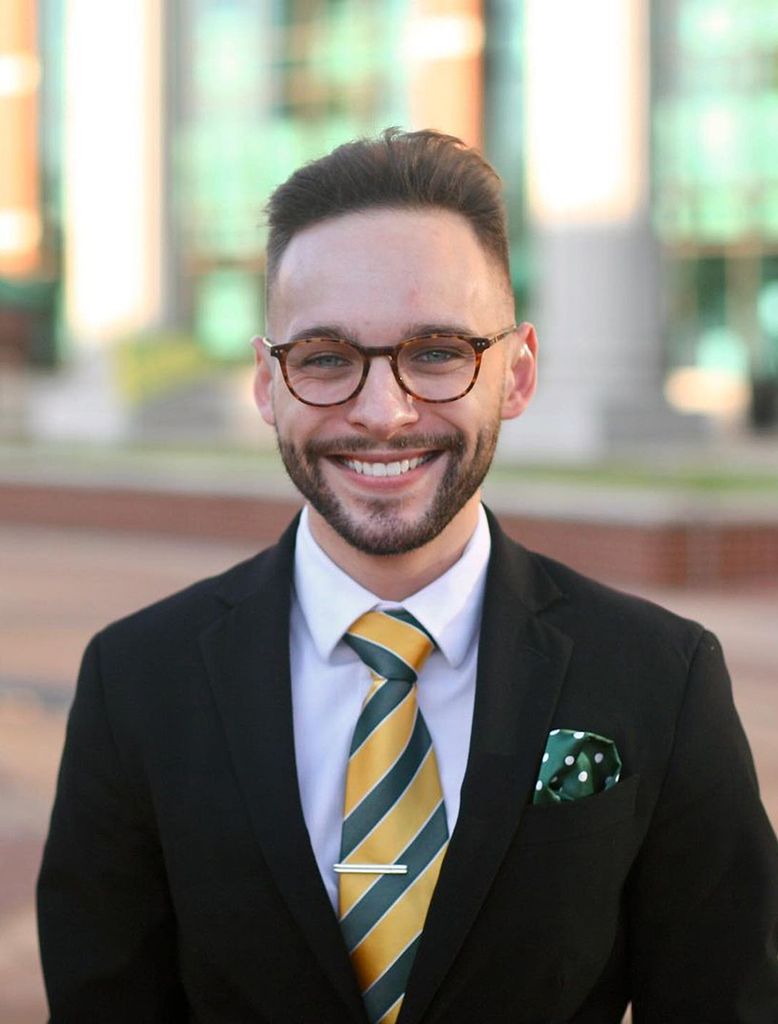Helping Others Find Hope Again.
Helping Others Find Hope Again
MPH student Dylan Gould wears many hats that support his public health interests outside of the classroom, from working as a research assistant and volunteering at a local hospital, to leading the student organization Mental Health Public Health Connections.
Health. Happiness. Hope.

These are the guiding principles that drive Master of Public Health student Dylan Gould’s interest in better understanding the conditions that shape mental health. After battling with and overcoming his own mental health struggles throughout his adolescence, Gould hopes to build a career where he can help others find relief from their own mental health challenges.
“What made me so passionate about mental health was not actually my own struggle with it, but it was finding my own health, happiness, and hope for the first time after overcoming it,” says Gould. “We really don’t talk about mental health much—especially where I grew up in the South—so for the longest time I didn’t know that things could get better. But there are ways to find relief again, and I want to be able to bring that to others.”
Gould is pursuing a certificate in community assessment, program development, implementation, and evaluation (CAPDIE) with a context certificate in mental health and substance use at the School of Public Health. He plans to attend medical school after he graduates in May 2023, but chose to pursue a degree in public health first because he felt he was often left with more questions than answers when it came to the disparities in care that he witnessed in hospital settings and knew he needed more advanced training to tackle these disparities head on. He was also interested in public health for the opportunity to be engaged in community-based work and research outside of the clinical setting.
“It is not enough for me to just be aware of the challenges that my future patients will have faced. I want to spend time outside of directly treating patients so that I can help to create programs and conduct research to better understand why these challenges exist for them in the first place,” he says. “I want to help create solutions that make it easier for people to get into the clinic to begin with and have access to appropriate care once they get there.”
Outside of the classroom, Gould wears a number of hats that support him in pursuing his mental and public health interests. He is a graduate research assistant in the Translational Research Program at Boston University, focusing in the Department of Psychological & Brain Sciences. Throughout his first year working in the lab, much of his work focused on using fear conditioning to better understand fear and anxiety disorders. Now, he is using his growing public health knowledge to advance the lab’s work at the intersection of public health and mental health, researching topics around substance use, barriers to care, and patient health outcomes.
Gould also serves as the liaison between his research lab and the National Institute of Health’s Science of Behavior Change Coordinating Center. In this role, he writes and publishes brief literature reviews on a number of mental health topics and how they relate to health outcomes and behaviors, as well as how certain aspects have been shown to be measured. The publications are then added to a growing resource repository on the NIH website that researchers can reference when conducting their own studies on similar topics of interest.
Beyond the research setting, Gould also volunteers at Massachusetts General Hospital as a patient transport volunteer—an opportunity, he says, that has kept him grounded in his career goals of going into the medical field.
“Going to the hospital is rarely fun for patients, so getting the opportunity to connect with them, take them to where they need to be, and just bring them a little bit of joy throughout their day can go really far,” says Gould. “Volunteering is often the highlight of my week, and it has really brought me back to why I am doing what I am doing.”
At SPH, Gould is the president of the student organization Mental Health Public Health Connections (MHPHC), which aims to increase awareness around mental illness and substance use disorders and promote wellness initiatives among SPH students. Over the last year, he has been instrumental in re-establishing the organization on campus, which had previously been dormant for a few years. With limited structure to build off of, Gould and his classmates have redesigned MHPHC, prioritizing building community both on and off campus and bringing in a greater focus on advocacy and community outreach with the development of two new e-board positions.
“Working on MHPHC has been the most fulfilling thing I have done throughout my academic career so far,” says Gould, crediting the support and guidance he has received from MHPHC faculty advisor, Carol Dolan, clinical associate professor of community health sciences. “We have been able to drastically grow the organization over the last six months, and we are looking to build meaningful connections on campus and in the surrounding community to ensure sustainability. There are some very driven and passionate folks on the leadership team now, and I can’t wait to see where the organization goes next.”
Throughout his time at SPH, Gould says he has enjoyed many things, from working and living in a major city for the first time to being surrounded by likeminded colleagues and classmates that are supportive of his personal and professional interests. As an academic, though, he says his favorite thing about being part of the SPH community is seeing and engaging with research that creates real change.
“There are so many people at SPH doing work that doesn’t just document the bad, but is actively doing good each and every day,” says Gould. “BU is committed to doing research that is truly making the world a better place, and it is really exciting to be a part of.”